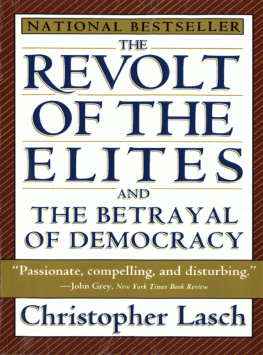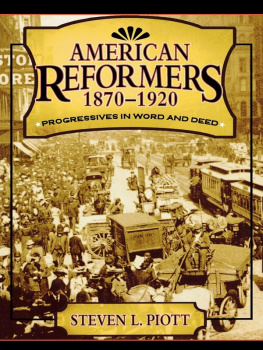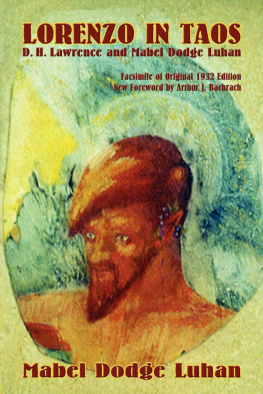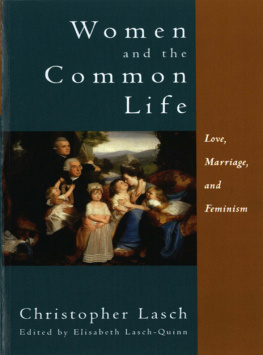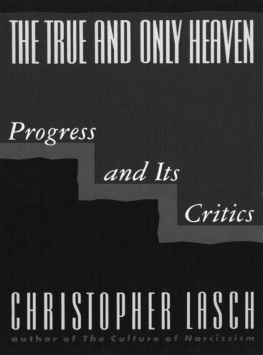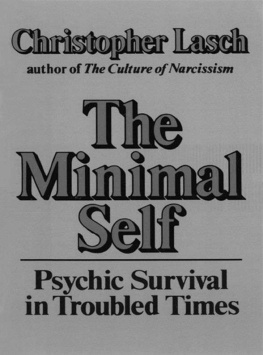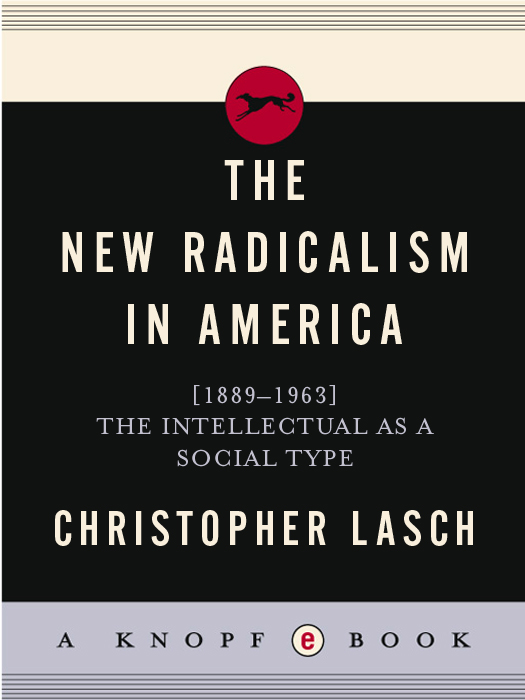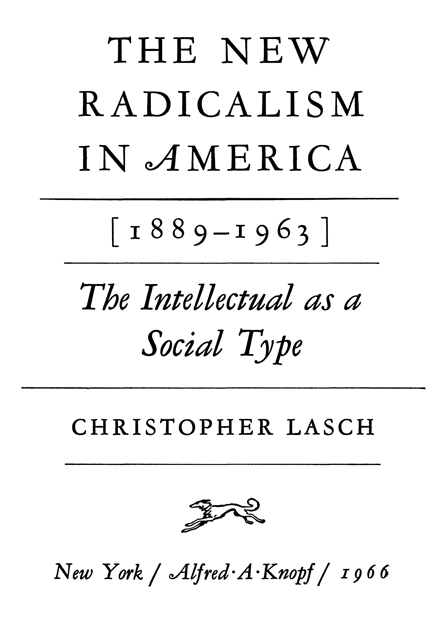
L. C. catalog card number: 65-11126
THIS IS A BORZOI BOOK,
PUBLISHED BY ALFRED A. KNOPF, INC.
Copyright 1965 by CHRISTOPHER LASCH. All rights reserved. No part of this book may be reproduced in any form without permission in writing from the publisher, except by a reviewer, who may quote brief passages in a review to be printed in a magazine or newspaper. Published simultaneously in Toronto, Canada, by Random House of Canada, Limited.
PUBLISHED MAY 17, 1965
eISBN: 978-0-307-83051-7
v3.1
FOR
NELL
ACKNOWLEDGMENTS
I AM GRATEFUL TO R ICHARD H OFSTADTER , H AROLD S TRAUSS , AND William R. Taylor for reading the manuscript and giving me their encouragement and advice. They have not, of course, always agreed with me. I should also like to thank Alfred A. Knopf for his reading of the manuscript, his generous interest in the work, and his advice on many points.
The Social Science Research Council gave me a grant of money which, supplemented by a grant from the State University of Iowa, freed me from academic obligations in order that I might write this book. The librarians of the State University of Iowa helped me by mailing books to England, where I did most of the writing, and by uncovering a collection of Jane Addams letters, unknown to me, in the library of the University of Kansas. I am greatly indebted to these organizations.
I should like to thank the publishers of the following books for permission to quote from them.
Prentice-Hall, Inc.: Drift and Mastery by Walter Lippmann, copyright 1961.
The Viking Press, Inc.: Untimely Papers by Randolph Bourne, copyright 1919.
The Macmillan Company: Democracy and Education by John Dewey, copyright 1944; Social Control by Edward A. Ross, copyright 1901; and Twenty Years at Hull-House by Jane Addams, copyright 1938.
Farrar, Straus & Company: Memoirs of a Revolutionist by Dwight Macdonald, copyright 1957.
G. P. Putnams Sons: Advertisements for Myself, copyright 1959, and The Presidential Papers, copyright 1960, 1961, 1962, 1963 by Norman Mailer.
Harcourt, Brace & World Inc.: Intimate Memories by Mabel Dodge Luhan, copyright 1933, 1935, 1936, 1937; The Letters of Lincoln Steffens, edited by Ella Winter and Granville Hicks, copyright 1938; and The Autobiography of Lincoln Steffens, copyright 1931, 1937.
Holt, Rinehart and Winston, Inc.: Characters and Events by John Dewey, copyright 1929.
Hill and Wang, Inc.: The World of Lincoln Steffens by Herbert Shapiro, copyright 1962.
Appleton-Century: Seventy Years of It by Edward A. Ross, copyright 1936.
Houghton Mifflin Company: Youth and Life by Randolph Bourne, copyright 1913.
For permission to quote from Lorenzo in Taos by Mabel Dodge Luhan, I am grateful to John G. Evans.
Excerpts from the following manuscript collections are quoted with the permission of the following individuals and institutions, to whom I gratefully acknowledge my debt.
Brooks Colcord: the Papers of Lincoln Colcord.
Yale University Library: the Papers of Edward M. House.
Columbia University Library: the Papers of Randolph Bourne.
The Board of Directors of Hull-House Association: the Papers of Jane Addams.
INTRODUCTION
T HE MAIN ARGUMENT OF THIS BOOK IS THAT MODERN radicalism or liberalism can best be understood as a phase of the social history of the intellectuals. In the United States, to which this study is confined, the connection is particularly clear. There, the rise of the new radicalism coincided with the emergence of the intellectual as a distinctive social type.
The intellectual may be defined, broadly, as a person for whom thinking fulfills at once the function of work and play; more specifically, as a person whose relationship to society is defined, both in his eyes and in the eyes of the society, principally by his presumed capacity to comment upon it with greater detachment than those more directly caught up in the practical business of production and power. Because his vocation is to be a critic of society, in the most general sense, and because the value of his criticism is presumed to rest on a measure of detachment from the current scene, the intellectuals relation to the rest of society is never entirely comfortable; but it has not always been as uncomfortable as it is today in the United States. Anti-intellectualism offers only a partial explanation of the present tension between intellectuals and American society. The rest of the explanation lies in the increased sensitivity of intellectuals to attacks on themselves as a group. It lies in the intellectuals own sense of themselves, not simply as individuals involved in a common undertaking, the somewhat hazardous business of criticism, but as members of a beleaguered minority. The tension is a function, in other words, of the class-consciousness of the intellectuals themselves.
Intellectuals have existed in all literate societies, but they have only recently come to constitute a kind of subculture. In fact, the word intellectual does not seem to have found its way into American usage much before the turn of the century. Before that, most intellectuals belonged to the middle class, and though they may sometimes have felt themselves at odds with the rest of the community, they did not yet conceive of themselves as a class apart. The modern intellectual, even when he chooses to throw himself into the service of his country or attempts to embrace the common life about him, gives himself away by the very self-consciousness of his gestures. He agonizes endlessly over the role of the intellectuals. A hundred years ago these discussions, and the passion with which they are conducted, would have been incomprehensible.
The growth of a class (or more accurately, a status group) of intellectualslive increasingly in a world all their own. The emergence of the intellectual class in the first couple of decades of the present century reveals the workings of the same process at a somewhat earlier period in time.
The intellectual class, then, is a distinctively modern phenomenon, the product of the cultural fragmentation that seems to characterize industrial and postindustrial societies. It is true that in the United States the agencies of social cohesion (church, state, family, class) were never very strong in the first place. Nevertheless, there existed during the first two and a half centuries of American history a sort of cultural consensus at the heart of which was a common stake in capitalism and a common tradition of patriarchal authority. There were social classes but, compared to Europe or even to American society during the colonial period, remarkably little class-consciousness; and whatever the real opportunities for social advancement, the myth of equal opportunity was sufficiently strong to minimize the tensions and resentments which later came to characterize American society. The whole society, wrote Tocqueville in 1831, seems to have melted into a middle class. All the Americans whom we have encountered up to now, even to the simplest shop salesman, seem to have received, or wish to appear to have received, a good education. Their manners are grave, deliberate, reserved, and they all wear the same clothes. All the customs of life show this mingling of the two classes which in Europe take so much trouble to keep apart.


